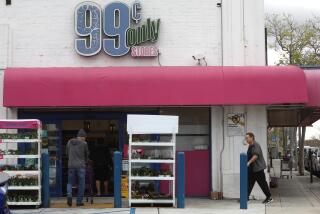William Zimmerman; Pic ‘N’ Save Founder
The poor boy who grew up on New York’s rough Lower East Side always had a knack for making a buck.
He bought stalks of sugar cane in Chinatown, walked 20 minutes back home and chopped it up. Then he sold the delicacy to Depression-weary neighbors who needed a treat at 2 cents a slice. The enterprising boy netted 50 cents a stalk.
Years later, after working his sales magic with used clothing and, while serving in the Philippines during World War II, cheap costume jewelry, he grew up to found one of the pioneering off-price retail chains. And ever mindful of his humble beginnings, he shared his hard-earned wealth with other poor children across the country.
William Zimmerman, who started Pic ‘N’ Save with a single store in Culver City and expanded the chain to 90 outlets in seven states, has died at the age of 80.
Zimmerman, who became a major benefactor of Boys and Girls Clubs of America after retiring from Pic ‘N’ Save in 1985, died Sept. 9 in North Palm Beach, Fla.
Like many veterans of the war, Zimmerman settled in Los Angeles in the late 1940s. He took a night job as a welder.
But he also traipsed around by day, knocking on manufacturers’ doors to glean stuff they wanted to get rid of. He bought anything--from shirts, which he peddled in bars or barbershops, to plastic household items that he resold to grocery stores.
“Buying and selling was what I knew,” he told Forbes magazine in 1982, when he was firmly ensconced on its prestigious list of the 400 richest people.
Eventually, Zimmerman opened his own store, calling it, appropriately, Freight Outlet. His family lived in the back, and when he was out looking for merchandise, his wife ran the store. In the early days, he roamed the countryside in a convertible crammed with the goods he bought for as little as 10 cents on the dollar.
Zimmerman soon had two stores, and invited a New York cousin by marriage, Arthur Frankel, to join him. The founder remained the finder, paying cash on the spot for factory overruns or outright mistakes. Frankel, who later became company president to Zimmerman’s chairman, trucked the booty to the stores.
The close-out chain continued to expand. In the 1960s Zimmerman renamed it Pic ‘N’ Save to get rid of the image that it sold salvage merchandise. By the time the chain went public in 1972, it was so popular that Zimmerman no longer had to go to possible sources. Brand-name manufacturers came to him.
He still went to trade shows, not to see new offerings, but to quiz manufacturers about warehoused dogs--yesterday’s fad clothing, out-of-season Christmas wrapping or swimsuits, mouthwash that just didn’t sell--they wanted to unload.
The company formula became to buy a brand name product for an average 25% of full retail price, sell it at 50% off retail or more, and reap profits of 50% of the Pic ‘N’ Save selling price.
“In a lot of cases, customers aren’t going to use the item,” Zimmerman once told Forbes. “They buy it because it’s a bargain and they can’t pass it up.”
By 1985, when Zimmerman retired and sold his Carson-based chain, there were 90 stores in seven Southwestern states. (The nationwide chain is now a part of Consolidated Stores.)
Zimmerman went on to try his formula on a Seattle-based company with a similar name, Pay’n Save, only to fail miserably. His old Pic ‘N’ Save sued over marketing the “Zimmerman strategy” to stockholders. But worse, the porcelain knickknacks, plastic key chains and junky earrings he bought cheap in Asia attracted no buyers. Many items had to be literally given away.
Zimmerman’s new sales-savvy customers, unlike his old ones, just didn’t seem to appreciate low-quality, cheap merchandise. So Zimmerman, who had bought a 50% interest in Pay’n Save, took a back seat in management, and turned his attention to philanthropy.
Hard-luck children in Fresno and across the country were glad he did.
In 1991, Zimmerman moved from Hawaii, where he had gone to work with Pay’n Save, to Fresno. After searching for years to find a way to aid young people, he suddenly found it. In 1994 he provided the seed money--$700,000--for a Boys and Girls Clubs of Fresno County Youth Center.
“They [tough youths today] tend to look for excitement. They don’t know what their goals are,” he told the Fresno Bee at the time. “Parents today don’t have the control they should. Parents are too busy trying to make a living. We’ve got to figure it out, where the problem all comes from.”
Zimmerman also became a major contributor to the National Foundation for Teaching Entrepreneurship, another way of offering a helping hand to young people through education.
Once widowed and once divorced, Zimmerman is survived by two sons, Stuart and Marc; a daughter, Susan Chroman; three sisters, Ida Rubin, Rose Zimmerman and Sarah Tepper, and 10 grandchildren and great-grandchildren.
A memorial service is being planned for Sunday in Los Angeles.
More to Read
Inside the business of entertainment
The Wide Shot brings you news, analysis and insights on everything from streaming wars to production — and what it all means for the future.
You may occasionally receive promotional content from the Los Angeles Times.










